Drive-Away Dolls Review: A Road Trip, Two Misfit Protagonists, Trouble Ahead, Grotesque Criminals
Cast: Margaret Qualley, Geraldine Viswanathan, Beanie Feldstein, Pedro Pascal, Colman Domingo, Matt Damon
Director: Ethan Coen
Where to Watch: In Theaters
Filmyhype.com Ratings: 3.5/5 (three and a half stars)
Drive-Away Dolls is a Thelma & Louise style adventure, full of suspense and outrageously funny, with bizarre characters reminiscent of the style of the Coen brothers but with new distinctive traits thanks to the contribution of Tricia Cooke. The protagonists are Margaret Qualley – actress daughter of art and seen in Poor Creatures and Sanctuary – here in the role of Jamie, an unbridled free spirit who despairs over yet another breakup with a girl, and the Australian rising star Geraldine Viswanathan – recently added to the cast of Marvel’s Thunderbolts – who plays her shy friend Marian desperate to let loose. Looking for a fresh start, the two take an impromptu road trip to Tallahassee, Florida, but things quickly go south when they cross paths with a group of inept criminals along the way. The cast is completed by Beanie Feldstein, Colman Domingo, Bill Camp, Pedro Pascal, and Matt Damon, protagonists of two memorable cameos.
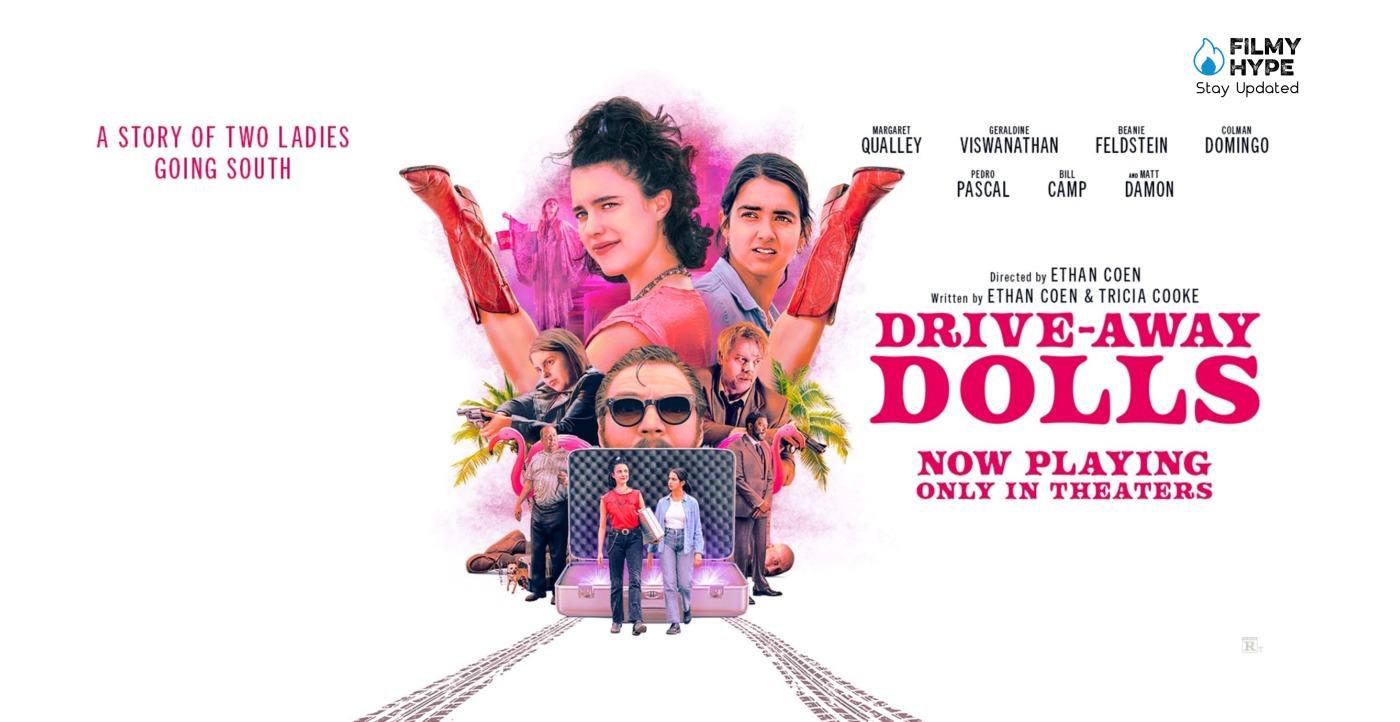
The second solo feature film for four-time Oscar winner Ethan Coen, Drive-Away Dolls is a free and light-hearted road comedy, which within a truly limited running time (the film lasts only 84 minutes, including the credits) succeeds miraculously in telling a circular story without too many or too many elements. A timing that is perfectly suited to the genre of cinematic comedy, so much so that the new experiment behind the camera by the Coen brother assisted in the screenplay by his wife and writer Tricia Cooke, is among the unfairly least celebrated titles in his homeland at the end of 2023. In our review of Drive-Away Dolls, we will tell you how this curious and explosive all-female road movie is more a creation of Tricia Cooke than a 100% Coean feature film. A confluence of styles, themes, and suggestions brought to the big screen by a heterogeneous cast led by two unmissable protagonists, including an increasingly good Margaret Qualley.
Drive-Away Dolls Review: The Story Plot
Philadelphia, 1999: a man named Santos (Pedro Pascal) sits in a bar nervously clutching a briefcase; he runs out and is followed by the bartender, who kills him in an alley and beheads him. Elsewhere in town, Jamie (Margaret Qualley) and Sukie are lovers whose relationship falls apart due to Jamie’s infidelity. After Sukie kicks Jamie out of their apartment, Jamie discovers that her friend Marian (Geraldine Viswanathan) is planning a trip to her aunt’s house in Tallahassee, Florida, and decides to go with her. The two head to a car rental service where you can drive a car for a one-way trip and deliver it to another customer. Due to a misunderstanding, however, they were given a car that someone else had already booked for a trip to Tallahassee. A car that contains a briefcase inside with very important contents…
To best frame the structure and ambitions of Drive-Away Dolls, it is right to take a step back and put co-writer Tricia Cooke under the spotlight. A personality of great importance for the cinema of Joel and Ethan Coen, she met the two brothers in 1989, when she took care of the editing of Crossroads of Death, their second film. From there, Tricia Cooke was the editor of other feature films by the dynamic duo, eventually marrying Ethan Coen in 1993. A “non-traditional” marriage, given that the editor is openly gay, and the two have always (although linked by love) lead an “open” and sexually unchained married life. With Drive-Away Dolls, Tricia Cooke makes her debut as a screenwriter and film producer and together with her husband signs a queer movie that will most likely become a cult.
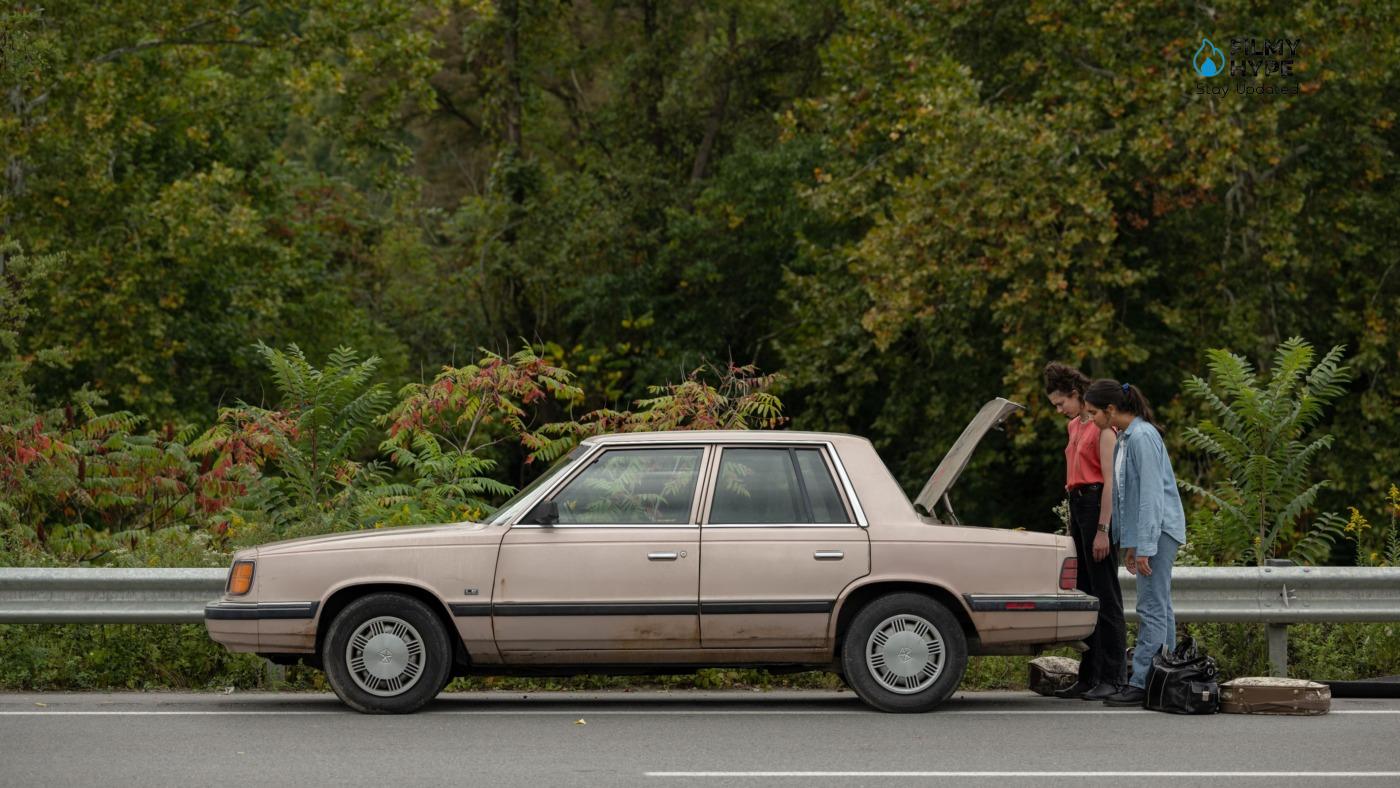
We are almost at the dawn of the year 2000, we find ourselves in a small diner in an American metropolis and a very frightened customer is clutching a metallic briefcase as if he were afraid that someone might take it away from him at any moment, perhaps even by force. The conditions for a not-too-happy evening for him, who perhaps even took it a bit. Let’s move on to another situation, much more pleasant, where we meet Jamie (Qualley), a beautiful sexually uninhibited girl, intent on having crazy joy together with her conquest of the moment, a busty young woman who willingly accepts the company of our protagonist. Indeed, co-protagonist, because the other is Marian (Viswanathan), who has the same sexual tastes as her best friend, but a completely different way of dealing with them. One is libertine, light-hearted, and resistant to relationships, while the other is in constant conflict with herself (a bit like the characters of Henry James who loves to read so much), divided between the sense of what is modest and convenient and what her instincts tell her.
The two leave to visit Marina’s aunt in Tallahassee, a way, says the girl, “to clear their minds”, but unfortunately for them (?) they buy a rental car where someone has hidden the metallic briefcase mentioned above, as well as something that beyond any reasonable doubt can make us understand how badly that evening at the diner ended almost at the dawn of the 2000s. During their love-filled road tour, during which Jamie will try to make her friend understand how sometimes you just have to let yourself go without always thinking about what is right and what is wrong, the two meet will find themselves being chased by a couple of gangsters, tasked with recovering the contents of this blessed briefcase, which hides the only thing that can ruin anyone’s reputation, regardless of intellectual stature or social prestige.
Drive-Away Dolls Review and Analysis
The tone of the film is the first thing that the authors decide to declare to the viewer, creating an incipit with grotesque and, practically, cartoonish tones, placing in the middle the presentation of what, even visually, is the most classic of MacGuffins. To tell us that even in Drive-Away Dolls we are in one of those Coen films, where everything seems obvious, but nothing is, or almost nothing. Although there is a surprise compared to the traditional MacGuffin, the literary citations (high as usual), the zany but at the same time significant subplot, and the thematic clarity, in this case, a light-hearted mockery of republican patriarchy that can do nothing but give in to sex, everything seems a bit like a faded copy of the past. That brilliance, that new impetus, results in the end, especially in the slightly irreverent dissolution of wet powders. Proof of this is the re-proposals of canonical situations and characters, especially the usual gags between the violent but idiotic criminals, representing the grotesque that ultimately make the story turn.
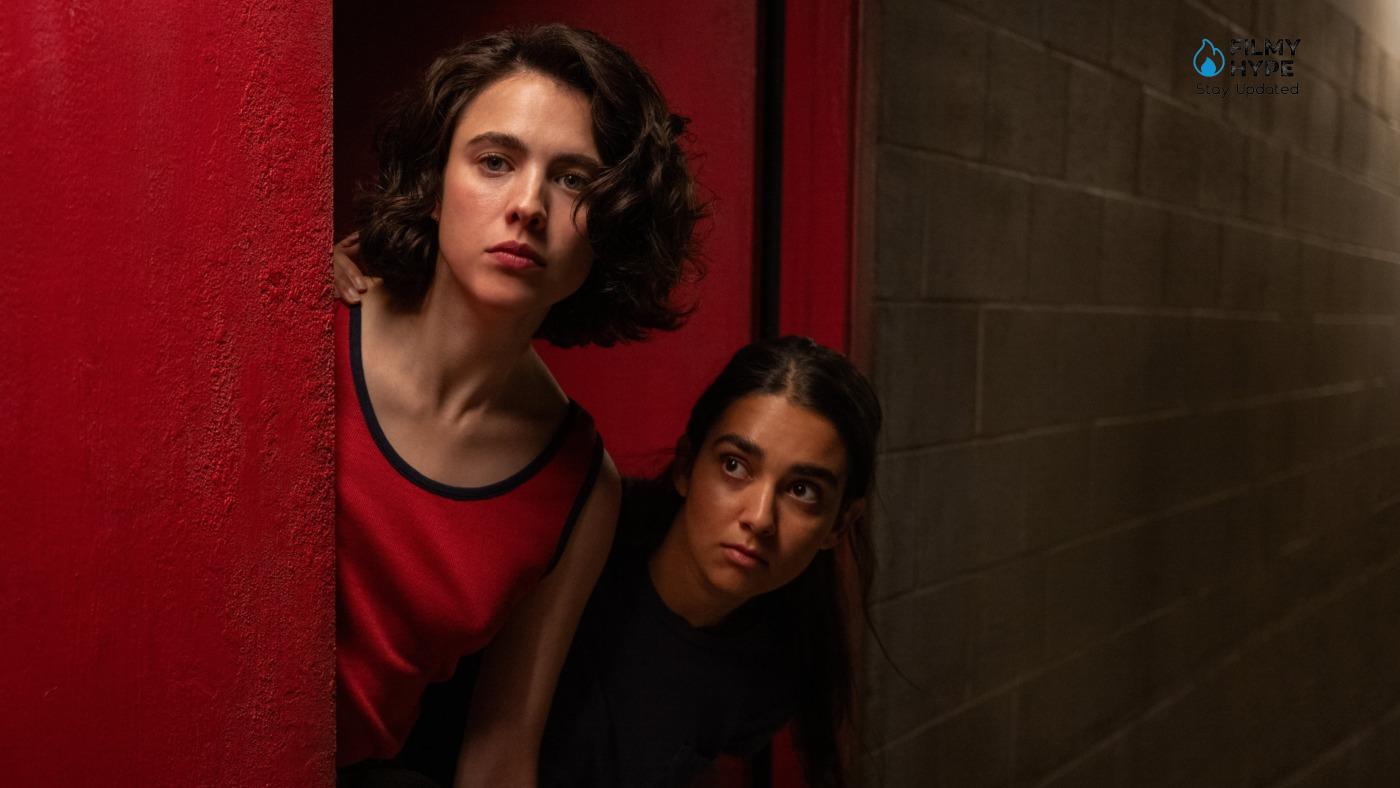
It is a militant buddy movie on the road in which a two-headed (female) monster travels through the American suburbs until he finds in his hands the “lever” to unmask male power, blackmail, take advantage, putting aside that sense of right or wrong fake and built by those who have no intention of respecting it. Coenian cynicism emerges in the good mix between crime and coming of age, an element that ultimately allows Drive-Away Dolls to propose that little game again, which, although a little faded, allows it to film. Now let’s see if there will be, a second chapter. The real title of Drive-Away Dolls, the one that was provisionally given by Tricia Cooke during writing, is revealed at the end of a film that seems in every way a Coen film steeped in queer culture. References that risk going unnoticed over the head of the average spectator: how many will perceive in the name of the unbearable dog Alice a reference to the gay icon Alice B. Toklas? How many will connect the surprise cameo linked to the contents of the briefcase with a reference to the artist Cynthia Plaster Caster, to whom the film is dedicated, by whom it was inspired?
Few perhaps, but the film deliberately speaks to a specific audience, capable of grasping the references to niche films, of juggling the comical-demented cameos of Matt Damon and Pedro Pascal, of enjoying an immersion in a certain proxemics of low range of the 60s, complete with very close-ups of the screaming faces of the protagonists, over the top sound effects, montages and transitions that have a hint of cartoon with a strong comical streak. The bizarreness of this project seems almost sealed by the presence of Margaret Qualley, an actress capable of slipping into unsettling, never-punished films, so much so that it is not clear what the order between cause and effect is. Is it her presence that pushes the films into the territories of the explicit and unorthodox or are the few bold and unconventional projects produced in this period that attract her like a magnet? Hard to say.
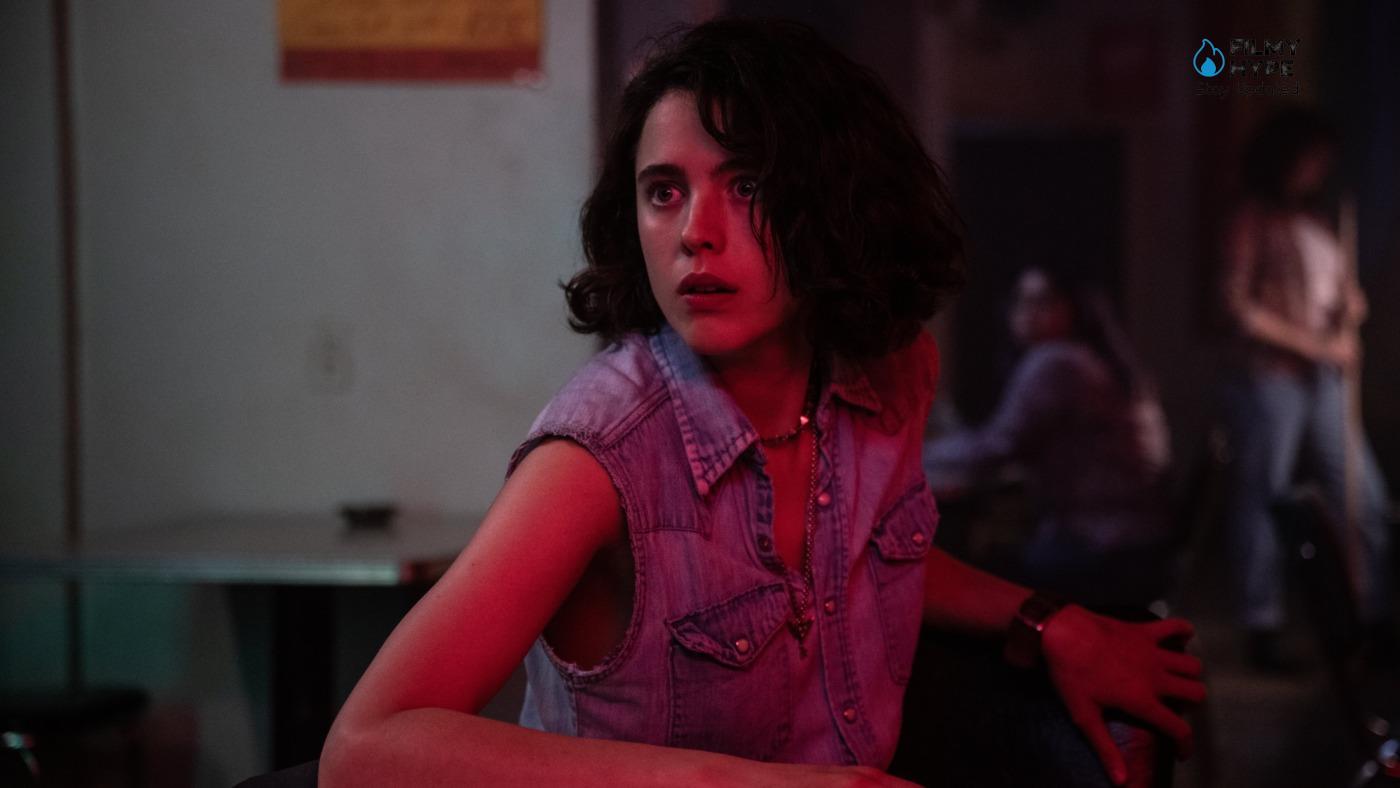
It makes you smile how Qualley navigates with ease the most sensual and most comical passages of films like this, which make the choices of her set colleague Emma Stone in Poor Creatures, considered by some to be very scandalous, seem all in all “safe”. Qualley here is a raging river, unstoppable, uninhibited verbally (wrapped in a thick Texan accent) and physically. She does well enough to counterbalance Geraldine Viswanathan, who is required to remain rigid and “closed like an oyster” for most of the film. Beanie Feldstein is perhaps the interpreter who comes out best, in her role as a dirty lesbian policewoman, very angry, irrepressible, and perfect as a Coenian character actor. The Booksmart actress seems born to move in the films and comedy of the Coen cinema. The Coen’s cinema Drive-Away Dolls lacks a bit of cohesion, the incisiveness of wanting to do something more than simply have fun and possibly entertain those who have the right references to grasp what this film is trying to do.
One could say, a bit prosaically, that Coen screws around in the end, has fun, and brings home the result, almost as if it were a film made for his entertainment, of him and his wife, little interested in the public’s reaction. We understood one thing. Joel without Ethan is far too serious and ambitious, Ethan without Joel on the contrary lets himself go to a joyful irreverence which makes his “solo” film very ramshackle and a little askew, at times genuinely funny, at other times too syncopated in its rhythm. Also in this sense, Qualley is a prescient presence, given her ability to slip into interesting and uninhibited projects by great directors (Tarantino, Lanthimos, Black) but, when she conquers the limelight (Clare Denis, Ethan Coen), Promising but clumsy films always come out. As in Stars at Noon, here too the film disorientates with its continuous ups and downs. In the theater, we laugh, of course, but we leave undecided whether we had fun or whether a bit of confusion prevailed, a bit of detachment from a film that isn’t always engaging.
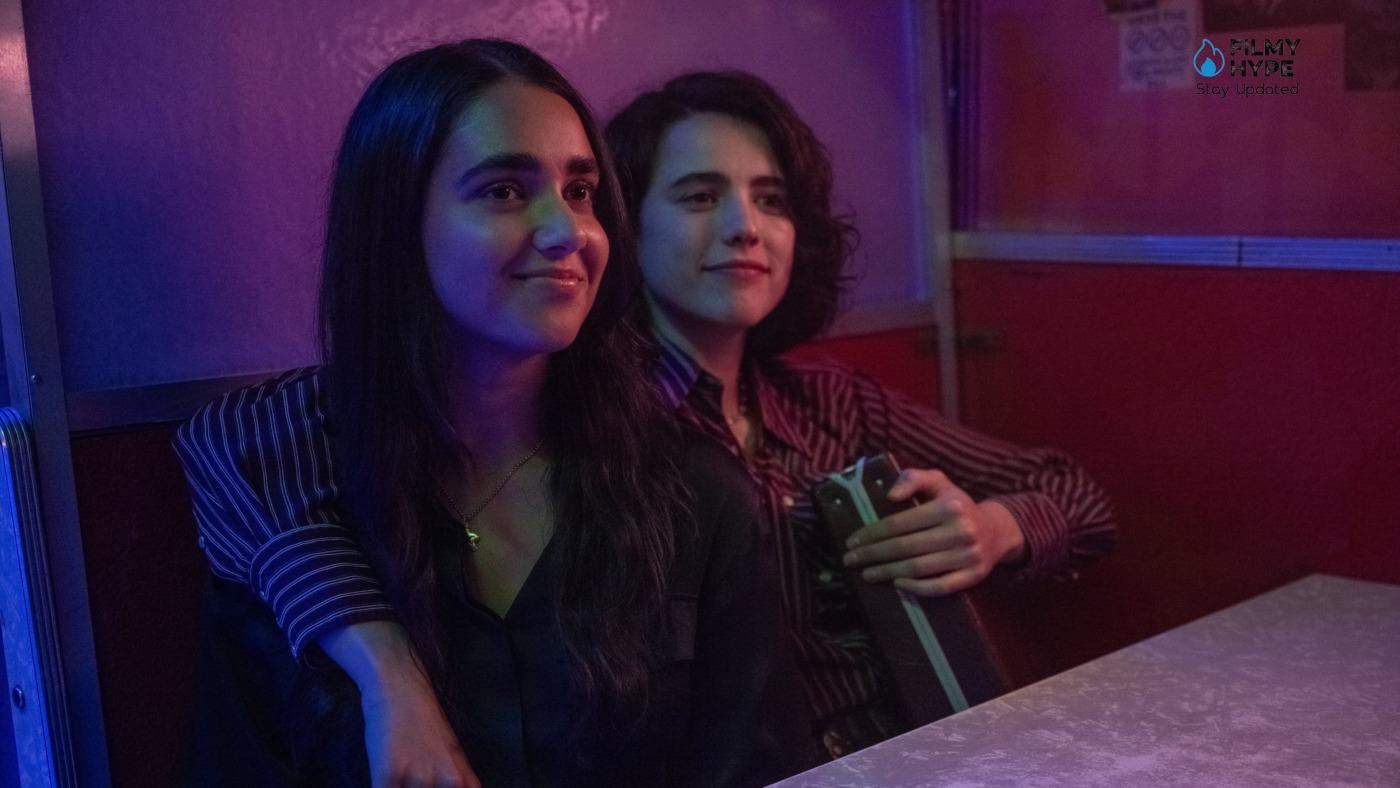
Ethan Coen brings to the screen a psychedelic film, a little nostalgic, a little queer, with the imprint of the 90s road trip. A film that certainly goes against the grain, but is very current and manages to entertain with sarcastic irony, helped by a part cast and fun cameos entrusted to Pedro Pascal and Matt Damon. The story is well structured and develops linearly, alternating comic moments with more serious scenes. The queer theme is strongly central, but the human and interpersonal side of relationships with certain dynamics is also explored. Ethan Coen does not take risks and offers a linear direction, except for a few visually interesting scenes that recall some elements of his previous films, he plays more on themes than on technicalities, making some references to other genre films such as Pulp Fiction. The editing, however, does not particularly shine, with choices that are not always functional, especially in the first part of the film.
The film could refer to a sort of criticism, precisely in the choice of the LGBTQIA+ theme, in a period like ours where political correctness is not always used correctly, underlining in an irreverent and over-the-top way some social dictates of a society that “preaches good but scratches badly”. The cast is driven by this duo of protagonists who are opposed both in spirit and character, but who manage to find a sort of balance through the journey. The characterization of the other characters is interesting, especially that of the antagonists, at times even biting. With the film Drive-Away Dolls, director Ethan Coen offers an irreverent, funny, sarcastic film with at its center a story that is at times surreal and oriented towards criticism, but ultimately a story of rediscovery and discussion by the protagonist duo. A film not for all tastes, but one that manages to entertain.
Drive-Away Dolls Review: The Last Words
Ethan Coen’s new solo film takes the Oscar winner back to the roots of the style and content that had made his way of making cinema distinctive years ago: a road trip, two misfit protagonists, trouble ahead, grotesque criminals, all in a feminine vein and with an irresistible queer note to frame it. Drive-Away Dolls is Ethan Coen’s first solo fiction film, born from a screenplay he wrote with his wife Tricia Cooke and in their minds the first chapter of a queer-themed trilogy. The film is a short story comedy conceived as a militant buddy movie on the road in which a polar opposite LGBTQ couple begins a journey in the name of love and ends up finding in their hands the lever to blackmail patriarchal politics who represent the Republicans of Trumpian origin. Crime, comedy, and coming of age, are mixed according to the ingredients of Coen’s comedy of errors, of which, however, ultimately turns out to be a faded copy. Magaret Qualley is very good, her neighbor, Geraldine Viswanathan, less so, despite all the good and bad of a film that fires a bit of blank, but in the end, reaches checkers thanks to the intellectual matrix behind it.







